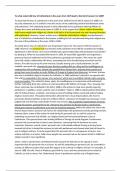To what extent did fear of Catholicism in the years from 1678 lead to the fall of James II in 1688?
To state that the fear of Catholicism in the years from 1678 led to the fall of James II in 1688 is an
accurate statement as it is evident it was the source of the underlying tension held between James
and parliament. This underlying tension is what ultimately led to parliament offering William of
Orange the crown and dethroning James in 1688. It can be argued that James’ actions themselves
holds more weight over religion as a factor in his fall as it led to personal rule and increased tensions
with parliament. However, James’ actions are so blatantly motivated by religion, and parliament’s
fear of Catholicism contributed to the tension, enabling his fall, and demonstrating that religion was
the root of the problems in the years 1678 to 1688.
As stated above, fear of Catholicism was the greatest reason for why James II fell from power in
1688. However, his personal rule and tensions with parliament must still be considered as holding
significance in this fall too, since James initially had a good relationship with parliament and ruined it
by abusing it. When he succeeded the throne in 1685, he faced little opposition and organised a
generous financial settlement at his first parliament, granting him freedom. This means he could
have had a better relationship with them, preventing him from forcibly being removed from the
throne, if he did not pursue his own interests. Despite having such a loyal parliament, he still
enabled a personal rule, showing his poor decision-making skills as a king and his unwillingness to
compromise with parliament, despite the goodwill they showed him, angering them greatly and
giving them more incentive to invite William of Orange to England and intervene. As James’ primary
aim was to establish religious freedom for Catholics, in 1685 parliament refused to co-operate with
him and he responded in the manner of an autocrat, which was to establish Catholic rights using his
royal prerogative. This evidently shows, again, his unwillingness to compromise with parliament,
further motivating their later actions of communicating with William of Orange. Thus, showing how
James’ personal rule contributed to his fall in 1688 as the actions he took were greatly angering
parliament. In addition, James used the case of Godden v Hales in 1686 to obtain judicial declaration
after Sir Edward Hales, a Catholic, was being accused of holding military command without taking
Anglican Communion. This judicial declaration allowed him to issue dispensations, like how he
previously allowed Catholics to become military officers, whenever he thought was necessary. It was
judged that only the king could decide if Hales was at fault. This is perfectly representative of James
abusing his powers, proving him to be a threat to law and how he did not want to compromise,
which gave reasons to parliament as to why he should be deposed. Whilst this effectively shows the
kind of impact James’ personal rule had on his relationship with parliament and the growing tensions
between them, many of the actions he took during his personal rule, as well his reason for
embarking on personal rule initially, are religion based and increased parliament’s fear of
Catholicism. This spurred them onto inviting William of Orange to invade England. Furthermore,
personal rule occurred due to James’ poor decisions, conveying that his decisions are more
important. However, overall, James’ personal rule is still notable without it being a driving factor
towards his fall as it started the tensions he had with parliament and showed what kind of threat he
was to religion and law. It can be argued that this personal rule is a consequence of James’ own
actions and that, as a factor, holds more weight over personal rule as the reason he fell in 1688, but
religion overall is more significant.
James’ actions and decisions contributed heavily towards his fall and can be argued as more
important than his personal rule as a factor. As well his embarking on personal rule, he committed a
number of different actions that made him appear to be a threat to religion and law. For example, in
June of 1688, his wife, Mary of Modena, gave birth to a son, and was announced to be raised as
Catholic, as well as James’ heir. Beforehand, those in parliament and the rest of England were




